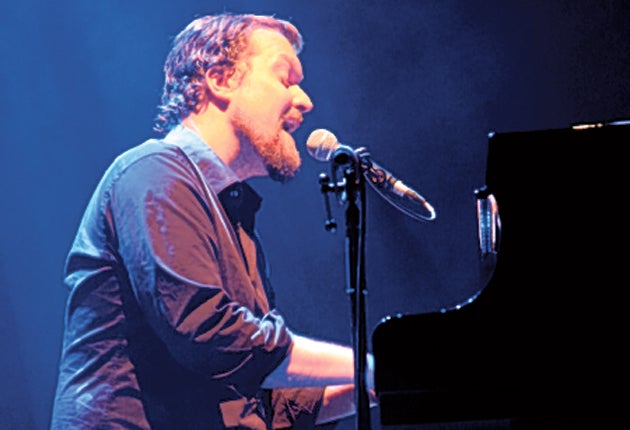John Grant, Queen Elizabeth Hall, London

He makes for an unlikely pop star, does John Grant. He's a portly, grizzled, gay American Midwesterner approaching middle age with scant name recognition – who just happens to have written one of the albums of the year.
His songs are contemplative epics, works of slow-burn grandeur played on piano and woodwind, pitched somewhere close to perfection by Grant's aching baritone. The Queen Elizabeth Hall is the perfect venue for his talents: it wasn't built to host measly old pop musicians, so the acoustics are far in advance of your average fleapit – and Grant's voice takes leave to fill the room.
He needs no second invitation, and his songs, already gorgeous on record, take on an even more fulfilling tone. The beauty of his work is all in texture, progression and subtle instrumentation. Never more than ambulatory in pace, tunes blossom into new loveliness. Not to say that it's all glum solemnity – several of his songs are jovial studies into past failures, and he's witty about the blackest of subjects: struggles with sexuality, drug abuse and suicide.
It's occasionally preposterous, as when songs like "Silver Platter Club" manage to combine quite exquisite self-hatred with Scott Joplin piano. In the end, he comes off like a melancholy Elton John.
The glory of the songs is set against the sparseness of the show; sitting at his whacking great piano is his only concession to visual opulence. Everything else is a tangled forest of monitors and amps, the occasional backing musician standing sheepishly amidst the mess.
One caveat: he doesn't half waffle before getting on with the singing. It's not that he's not charming or amusing – he is – but he sure loves to talk, and each song is prefaced with a long reminiscent spiel. People lap it up, though, and it's only strange because few other musicians have the confidence to talk their way through their own songs. Likely as a star or not, that's exactly what he is.
Join our commenting forum
Join thought-provoking conversations, follow other Independent readers and see their replies
Comments
Bookmark popover
Removed from bookmarks